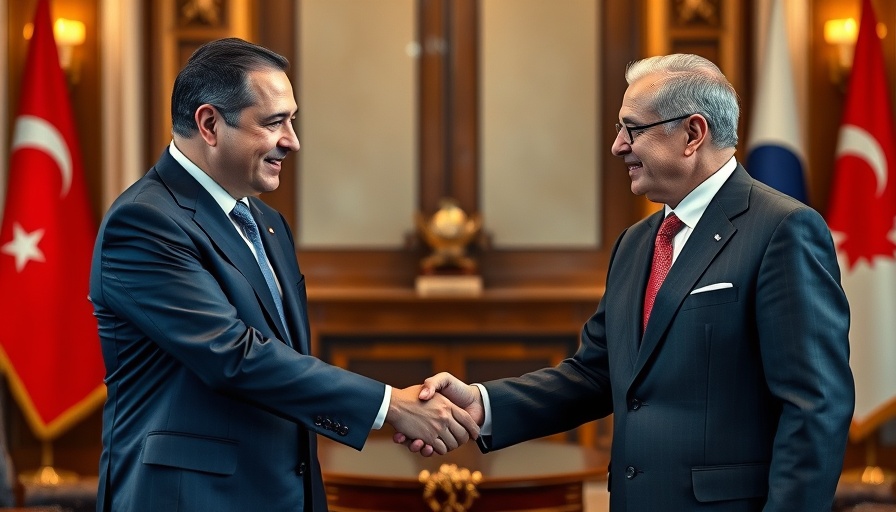
Reviving India-China Relations: A New Era?
In a significant step toward mending relationships between two of Asia's most powerful nations, Indian Prime Minister Narendra Modi recently met with Chinese Foreign Minister Wang Yi in New Delhi. The meeting, held on August 19, 2025, marks a pivotal moment in a long, strained relationship that has seen its share of conflict, particularly since the violent border clashes of 2020, which left numerous soldiers dead and diplomatic ties in disarray.
During the meeting, Modi expressed optimism about the ‘steady progress’ being made in bilateral relations, highlighting the importance of mutual respect for each nation's interests. Both leaders acknowledged that the setbacks experienced over the past few years were not in the best interest of their countries, emphasizing a commitment to maintaining peace and stability along their contested Himalayan border.
The Historical Context of India-China Tensions
India and China share a complex history of glances, border disputes, and ideological differences. Following independence in 1947 and the Chinese Civil War, tensions rose further with the Sino-Indian War in 1962, which arose from border disputes. Since then, various attempts at resolution have often been clouded by accusations and skirmishes. The 2020 clash marked one of the gravest escalations in decades, grounding diplomatic efforts to a halt. Understanding this historical context is key as leaders strive to redefine their narratives moving forward.
Why This Meeting Matters for Global Politics
In today's interconnected world, the dynamics between these nuclear-armed neighbors extend beyond their borders. Modi’s discussions with Wang come at a time when the geopolitical landscape is increasingly shifting. The U.S.-India relationship has faced its own challenges, particularly with the imposition of tariffs under previous administrations, leading to increased scrutiny of India’s role as a counterbalance to China’s influence in Asia. If successful, the reparation of India-China ties could redefine regional alliances and strategies, potentially easing tensions across a fraught Indo-Pacific region.
Addressing the Human Element: Local Perspectives
For residents of Central Florida, the implications of international relations may seem distant. However, as globalization continues to influence local economies, understanding these dynamics becomes increasingly critical. Businesses that rely on international trade could feel the effects of improved relations or, conversely, heightened tensions. Furthermore, families with ties to both nations may find hope in strengthened cultural exchanges and economic partnerships going forward.
Future Predictions: Will Peace Last?
The path ahead is fraught with uncertainties. Many analysts predict that while this meeting signals a willingness to collaborate, underlying issues remain. The contested borders in the Himalayas are just one of many factors that could trigger renewed hostilities. Experts suggest that sustained dialogue and a shared commitment to conflict resolution are needed to foster lasting peace. Local stakeholders in Central Florida and beyond should keep an eye on these discussions as they could have far-reaching implications on global trade, security, and cultural relationships.
Emotional and Human Interest Angles
At the heart of international diplomacy are the real people affected by these relationships. Exiled Tibetans protesting during Wang Yi's visit underscore the human stakes involved. For many, the dialogue between India and China is not merely a political maneuver; it directly impacts their lives and rights. Addressing human rights concerns, border security, and openness to dialogue are essential to building a foundation of trust, both between governments and among their peoples.
Changing the Narrative: Actionable Insights
Understanding the nuances of international relations is critical not just for political analysts but for everyday citizens as well. Engagement in community forums and discussions about foreign policy can empower residents to voice their opinions and influence local perspectives on international issues. As we navigate these complex narratives, fostering an inclusive dialogue about their impacts can strengthen our community’s understanding and responsiveness to global events.
In conclusion, as we witness the ongoing developments in India-China relations, it's crucial for the public to stay informed and engaged. The stakes are high, and the ramifications of this new chapter in diplomacy could resonate well beyond the Himalayan borders.
For residents eager to understand more about how these developments impact their lives and communities, exploring diversified news sources and partaking in discussions surrounding international affairs can be beneficial. In an age where global events shape local realities, understanding the complexities and relationships between nations becomes essential.
 Add Row
Add Row  Add
Add 




Write A Comment